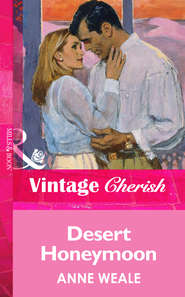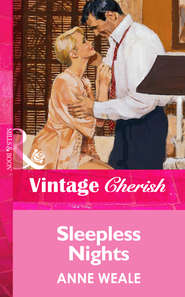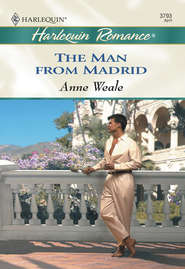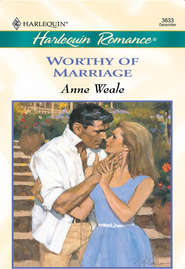По всем вопросам обращайтесь на: info@litportal.ru
(©) 2003-2024.
✖
The Bartered Bride
Автор
Год написания книги
2018
Настройки чтения
Размер шрифта
Высота строк
Поля
Less than twenty-four hours ago she had stormed out of his office, convinced he was out of his mind. Now she was going to have lunch with him. Had she gone out of hers?
Before setting out for their lunch date, Fran reread the file Reid had sent her.
He was thirty-four, twelve years older than herself. A big age gap. It seemed likely that wasn’t the only gulf between them.
Kennards, a merchant bank dealing with long-term loans for governments and institutions and advising on takeover bids, had been founded by his great-grandfather. The controlling influence had been retained by Thomas Kennard’s descendants.
Unlike her father, Reid hadn’t had to claw his way up from nothing. The facts in the file indicated that from birth he had been groomed for the position he occupied. But family influence couldn’t have made him head boy at his public school if he’d lacked the qualities needed for that position, nor could it have gained him an impressive degree at one of England’s most prestigious universities. He had to have a brilliant brain.
So why pick someone as unbrainy as me? Fran pondered uneasily. She knew she had other equally important qualities and had never wanted to exchange them for a superior intellect. But for a man like Reid deliberately to select a female who operated by instinct rather than logic seemed strange, not to say suspect.
He lived in a large house in one of the most select squares in the ultra-fashionable Royal Borough of Kensington. The butler opened the door to her and took her coat.
A man in his fifties, dressed in an ordinary dark suit with a discreet tie, he led her up a sweeping staircase, past a line of family portraits, to a large first-floor landing. As they reached it, Reid was descending the stairs from the floor above. She noticed his thick dark hair was damp and wondered why. It seemed an odd time of day to take a shower.
‘You’re admirably punctual,’ he said, holding out his hand to her.
As they hadn’t shaken hands the day before, it was her first experience of the firm clasp of his fingers. Then he took her lightly by the elbow to steer her across a rose and gold Aubusson carpet and through open double doors in an elegant drawing room with three tall windows overlooking the square.
Normally Fran would have swept an appreciative glance around the beautiful room, taking in some of the details. Instead she was overwhelmed by the strength of her reaction to their first physical contact.
‘I nearly kept you waiting,’ said Reid. ‘I came back from the bank at eleven to go for a run in the park. As I was coming home I saw an old man on a bench who obviously needed medical attention. That held me up.’
‘Do you run every day?’
‘I try to. Are you a runner?’
Fran shook her head. ‘I play tennis and ski. I don’t do work-outs.’
He slanted an appraising glance at her figure. Today, in place of the black suit, she was wearing a designer outfit bought on a holiday in Italy. It consisted of a fine jersey-knit top in lilac, a waistcoat in violet, and a swirling chevron-striped skirt combining those colours with pink and pale pistachio-green. The audacious colour combination was perfect with Fran’s dark red hair and green eyes.
‘You look in good shape,’ he remarked. ‘But people in desk jobs like mine need some kind of fitness regime to stave off the bad effects of a sedentary lifestyle. Come and sit down. What would you like to drink before lunch?’
She remembered his remark about the wine she had been drinking when he forced his way in the previous evening. Was he one of those people who drank only mineral water and made everyone who didn’t feel on a lower plane?
Fran had no intention of allowing him to intimidate her. ‘A Campari and soda, please,’ she said firmly.
Reid said to the butler, who had been following them at a discreet distance, ‘A Campari for Ms Turner and my usual, please, Curtis.’
With a silent inclination of the head, the butler withdrew.
‘Let’s sit over here, shall we?’ Reid steered her towards a group of comfortable chairs near one of the windows. ‘Have you finished your packing?’
‘Almost.’
Knowing that she wouldn’t be able to sleep, she had worked on it till long past midnight. At half past nine this morning a dealer from whom she had bought a lot of the furnishings had come round to buy them back. Luckily Fran had paid for them out of her bank account. Although the money in it had come from her father, technically they were her property, not his. As soon as his business had been forced into receivership, everything George Turner had owned, including the family home, belonged to his business creditors. But the cash the dealer had handed her could go in her own pocket.
It wasn’t much but it was better than nothing if, when Reid spelt out the terms of this trade-off marriage, she found that she couldn’t accept them.
‘What date is this house?’ she asked, looking up at the elegant cornice around the ceiling and the two crystal chandeliers, their chains swathed with coral silk to match the festoons of silk cord and big coral tassels at the tops of the heavy cream curtains.
‘Late eighteenth century. Are you interested in architecture?’ He sounded faintly surprised.
‘Sometimes.’
The butler came back with their drinks, hers a slightly more vivid red than the coral linen slipcovers on some of the sofas, Reid’s colourless except for a twist of lemon floating among the ice cubes. It could be gin or vodka, or it could be straight mineral water.
Reid said, ‘This was my grandparents’ house. My paternal grandmother still lives here when she’s not staying with her daughters. I moved here when my father died. We had been living in Oxfordshire and commuting by helicopter. For the time being I have an apartment on the top floor. But I thought you would feel more comfortable being entertained in the main part of the house,’ he added, with a gleam of amusement.
After a slight pause, he added, ‘I shall move out when I marry. The country is better for children... if their parents can choose where to live. Most people can’t of course.’
‘Where are you thinking of moving to?’ Fran asked.
‘I haven’t decided.’ His expression was enigmatic. ‘Where would you choose to live, given a free choice?’
Fran considered the question. Once the answer would have been ‘Wherever Julian wants to live’.
She said, ‘Probably not in England. Ideally, I’d like more sun than we get in this country. I wouldn’t mind living by the sea...or a lake would do as long as it had mountains round it. I’d like to look out on mountains... big ones with snow on top.’
He lifted an eyebrow. ‘Sounds as if New Zealand would suit you.’
She shook her head. ‘I’m sure it’s a beautiful country but it’s too far away from Europe. Have you been there?’
Reid nodded. ‘The scenery’s magnificent...when it’s not raining. The South Island shares England’s problem. Unreliable weather. Where have your travels taken you?’
‘Mostly to holiday places...the Caribbean in winter... resorts round the Med in summer. My mother’s a passionate gardener. She doesn’t like travelling alone, even in a group. I’ve been on some garden tours with her...the south of France, Ireland, California. Where do you go for your holidays?’
‘I used to go with my father who also liked someone with him. We went to Japan together and to other Pacific Rim countries. I travel a lot for the bank. For pleasure I usually go to France or Spain. Where would you like to go for our honeymoon?’
The question, tacked on to innocuous small talk, took her by surprise.
‘I haven’t agreed to marry you,’ she said coldly.
‘If you found the idea unthinkable, you wouldn’t be here,’ he said dryly. ‘Let’s be straight with each other, Francesca. I need you...you need me. It’s a sensible, practical arrangement.’
She knew that at least the first part of what he said was true, but she wasn’t about to admit it. Was it pride that made her reluctant to fall in with his plan too readily?
She said, ‘I’m not clear why you’ve selected me.’
‘You’re very attractive...as I’m sure you’re aware.’
‘Is that all you want in a woman? An acceptable face and figure? Don’t you care what I’m like inside?’
‘I can make some intelligent guesses. People can’t hide their characters,’ he told her casually. ‘Even in repose a face gives a lot of clues to its owner’s temperament. Apart from yesterday’s evidence that you have a short fuse, I haven’t detected any characteristics I wouldn’t like to live with.’
His arrogance took her breath away. In that moment of silent shock, she was struck by the thought it would be both a challenge and public service to bring this man down from his lofty pinnacle and convert him into an acceptably unassuming person.
But perhaps it was already too late. One of Gran’s favourite sayings was, ‘What’s bred in the bone must come out in the flesh.’











